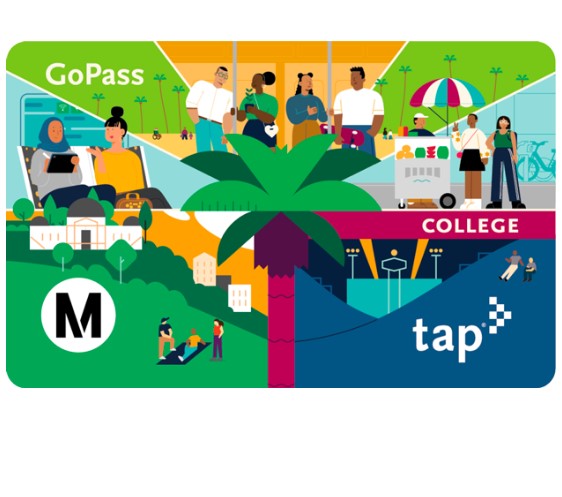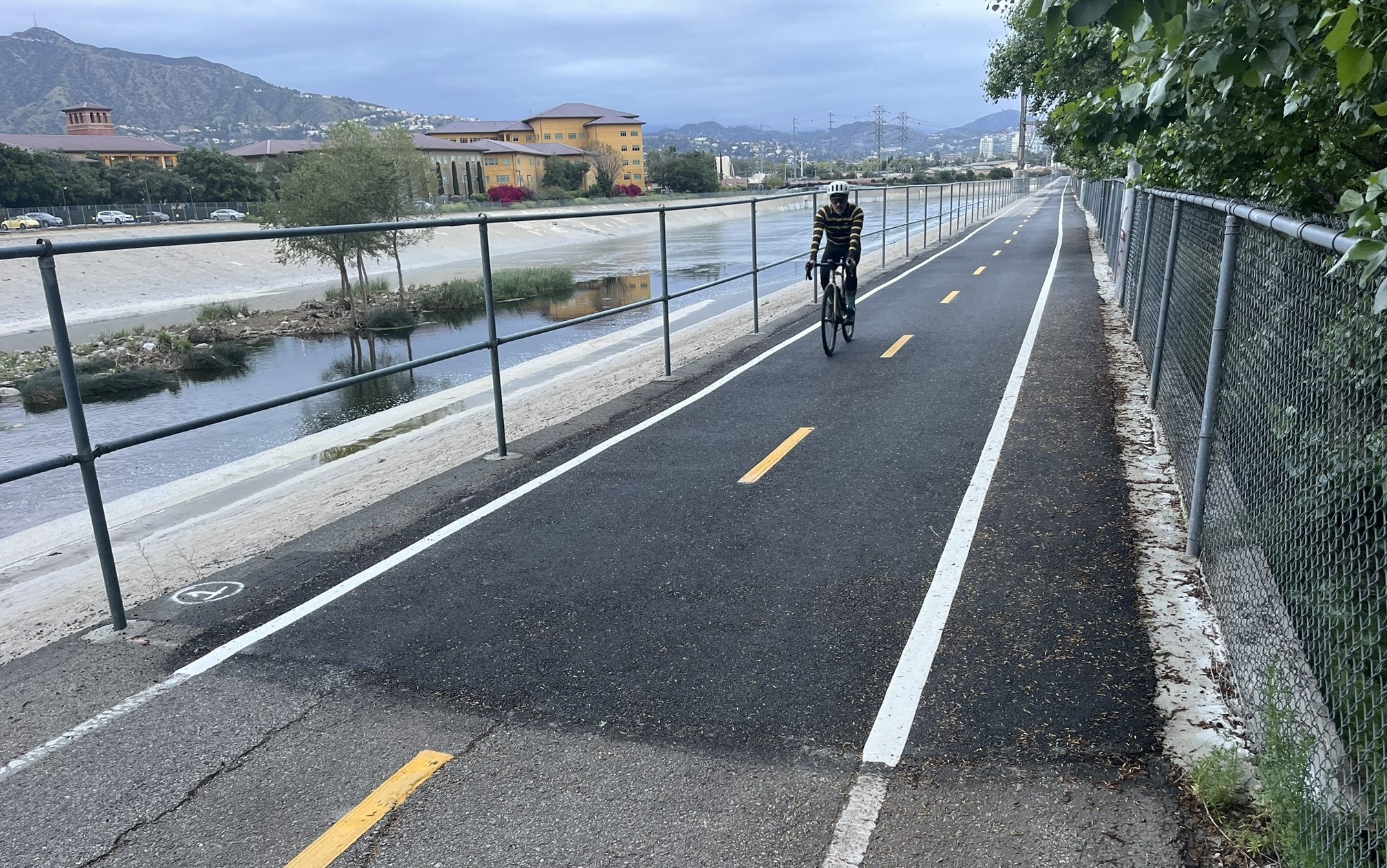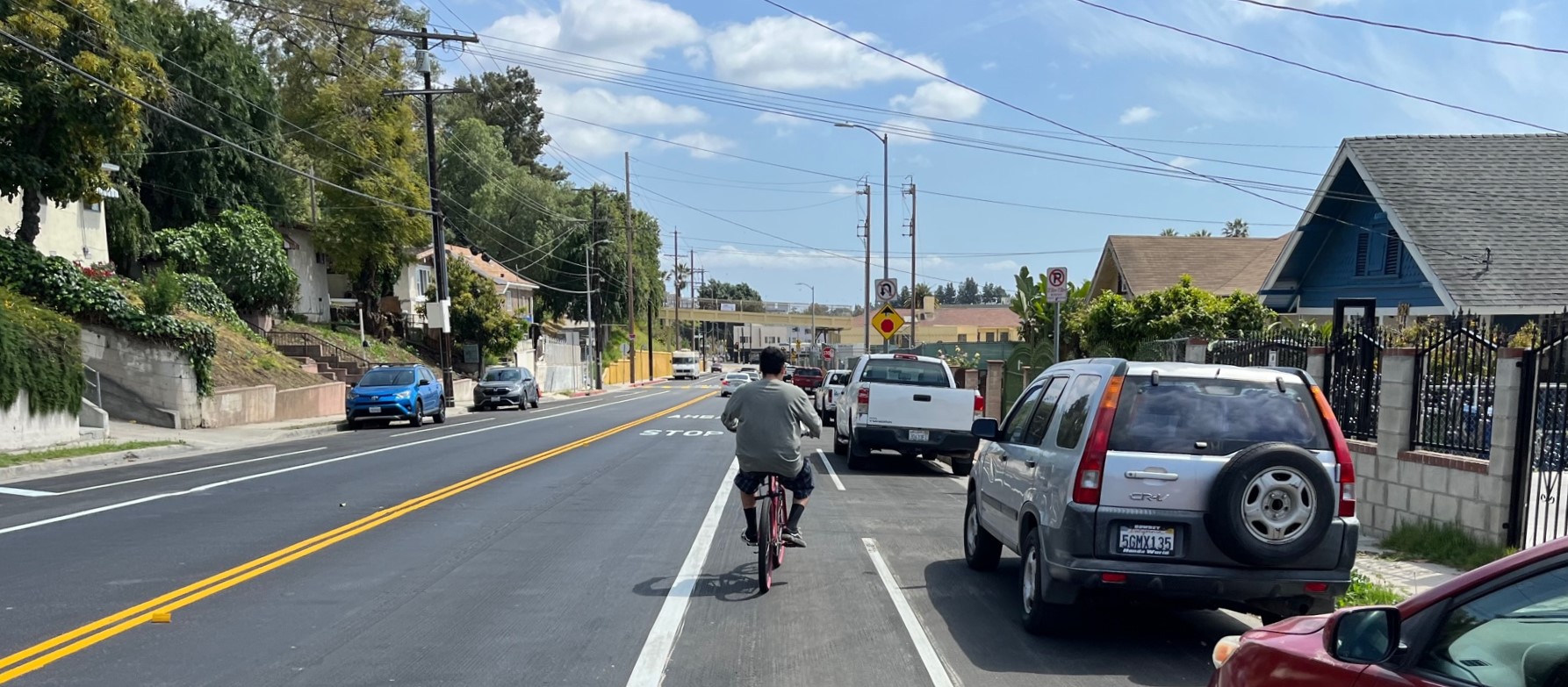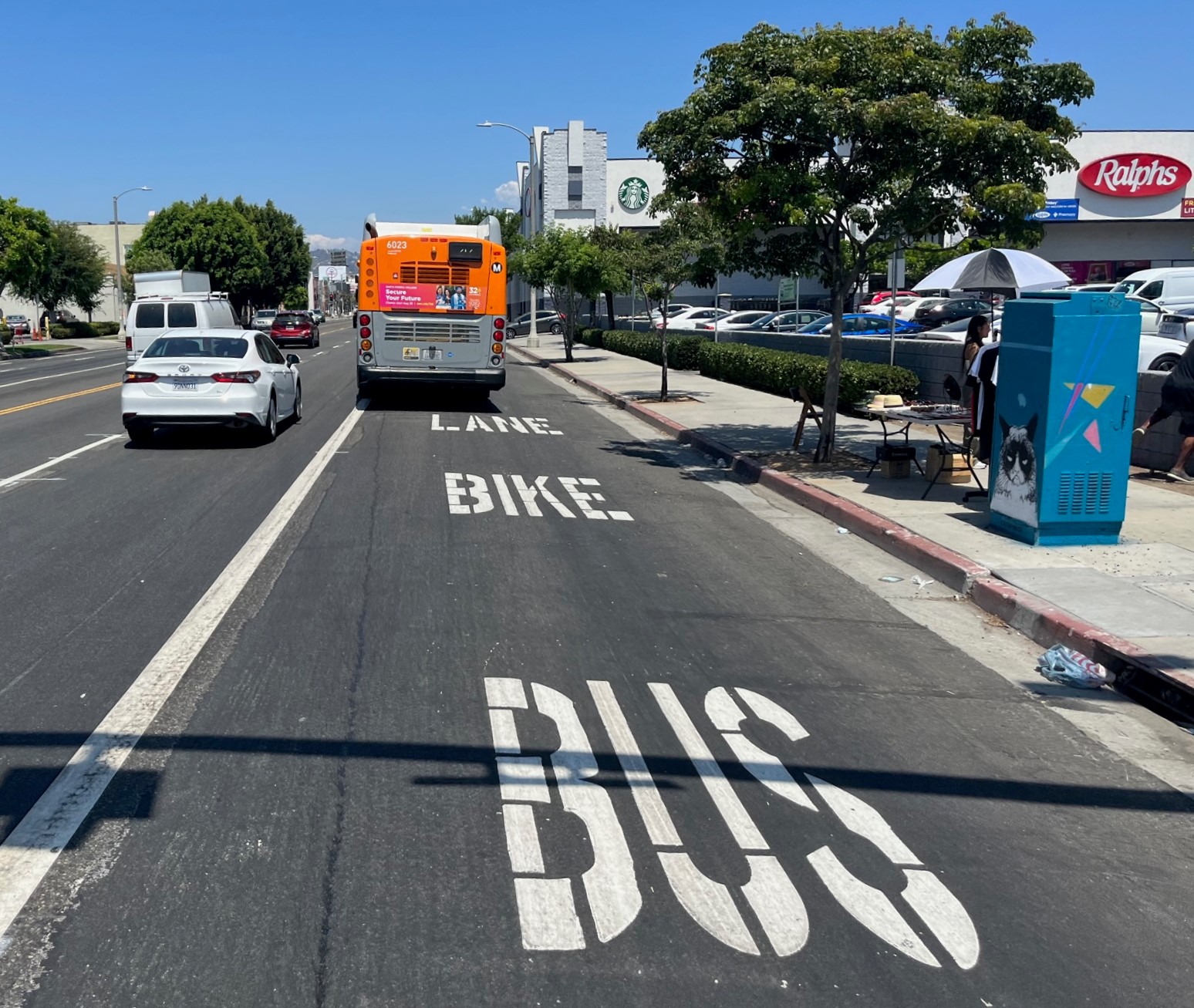“Ovaries so Big…” that They’ve Got Their Own Documentary
1:43 PM PST on March 1, 2016
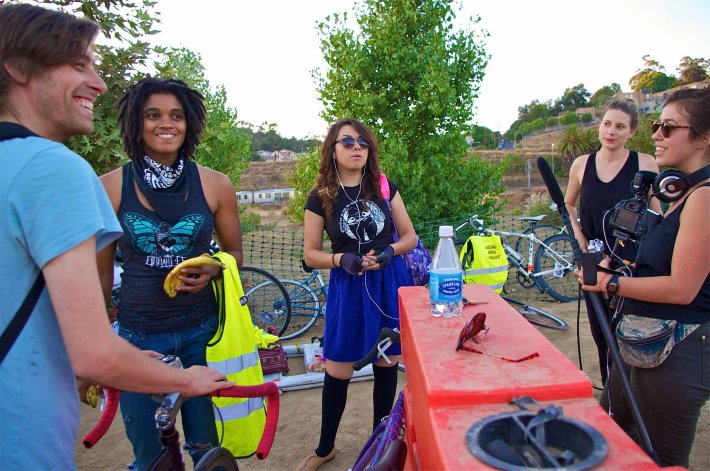
The Ovarian Psyco-Cycles have been a game-changer in the Los Angeles cycling landscape. And now, with a documentary featuring the stories of three of their members set to debut at South by Southwest (SXSW) this year, they are essentially announcing that they are here to stay. Y con ganas.*
The Ovas first burst into the cycling community's consciousness in 2012, when former Streetsblog writer Kris Fortin wrote a two-part introduction to a group of bad-ass womyn of color with "ovaries so big, [they] don't need no fucking balls.” (Part two is here)
Fortin's exploration of the life challenges that had brought the womyn together and the sisterhood that grew from cycling and reclaiming the streets as a group elicited cheers from readers here and around the country.
Then the Ovas decided to hold a "Clitoral Mass" bike ride to celebrate their two-year anniversary and some folks lost their damn minds.
While the idea of carving out space for womyn and womyn-identified folks — particularly those of color — who don’t feel their experiences are validated or welcome in other cycling spaces is not terribly controversial right now, conversations around equity, inclusion, and the mobility of those on the margins had yet to really take root in the livable streets movement. So, the idea of a female (identified)-centric ride caused a bit of a stir.
The Ovas were accused of exclusion by some and of misandry by a (thankfully) small minority of disgruntled men. Some of the critics threatened to show up and crash the ride. A few even took it upon themselves to organize a counter-balancing ride for “Brovarian Psychos,” where those poor and oppressed (and grammatically-challenged) souls seeking to promote “man-ism, jism, mens’ rights, reform of family court, selective service, anti-male stereotypes, to counter-manginas and white knights, and restore balance to the force” could finally feel supported.
Despite all the foolishness, the Ovas’ first event went off peacefully. And instead of the world ending, the ride became something of an institution — a day of sisterhood and solidarity around which riders from around the Southland and beyond were willing to adjust their summer schedules so they could be sure to be in town. It even inspired a national movement and, in 2013, saw sister rides spring up in Oakland, Toronto, New York City, Atlanta, and Chicago. Last year's ride was no different. Hundreds -- many of them new to cycling -- showed up in the heat to spend a day exploring the city, sharing meals, dancing at pit stops, and engaging in conversations around social justice.
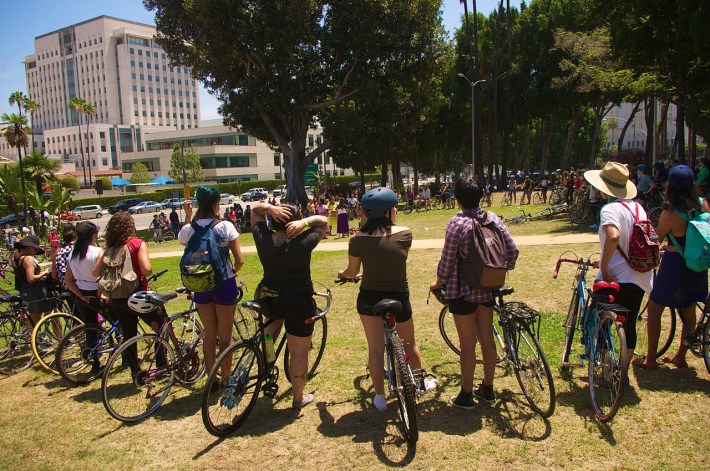
The Ovas' visibility has helped change stereotypes about who bikes and complicated the conversation around what cycling and, more broadly, accessing the public space, means to different communities.
For many urbanists, "reclaiming" the streets means staking out physical space for people with things like pedestrian bump-outs or open streets events. For groups like the Ovas, "reclaiming" space is about shining a light on how the social, cultural, and economic landscapes of a city intersect with the physical one. Consequently, their ride events serve as vehicles for advancing social justice, elevating the voices of those on the margins, demanding freedom from harassment by law enforcement (for people of color) and/or misogynists, asserting cultural self-determination, promoting pride in their community, connecting to their heritage, and lending strength and power to other womyn and womyn-identified folks.
A bike ride, in other words, is never just a bike ride.
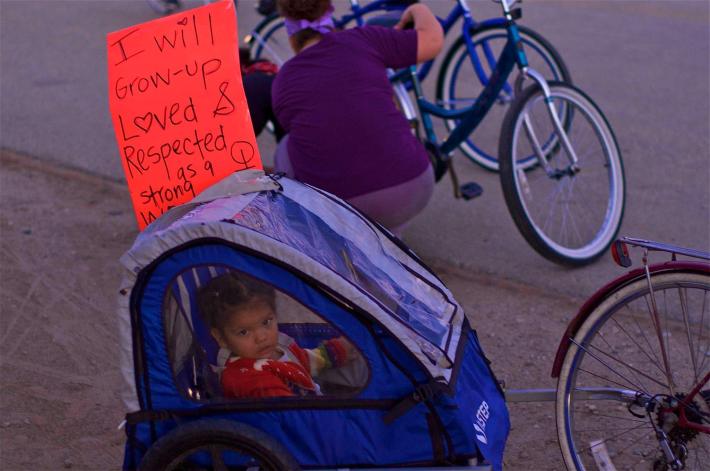
But if there is one thing that has become clear over the years that I have been on the communities beat for Streetsblog, it is that, unless someone comes from an experience of marginalization, it can be hard for them to understand how it impacts every aspect of your life -- particularly your movement through the public space -- or why finding spaces that validate your voice matter so much.
Which is why I have high hopes for the feature documentary the Ovas will debut at SXSW this year.
The film follows three of the Ovas -- founder Xela de la X, artist Andi Xoch, and newcomer Evie Martinez -- as they balance activism and leadership with their obligations to themselves and their families in the context of the working-class Latino community of Boyle Heights.
It's thrilling to know that such an incredible group of womyn will be given a national platform from which to invite people into their lives and journey to forge their own "hybrid form of urban feminism," as filmmakers Kate Trumbull-Lavalle and Joanna Sokolowski call it.
Nerdily, it's also exciting from a livable streets perspective in that viewers of the urban planning persuasion may be able to see firsthand why and how, for womyn like Xela, Andi, and Evie, truly and equitably reclaiming the streets for everyone requires more than investments in basic infrastructure.
The film, according to the Kickstarter page, is just about finished. But filmmakers need funds to finalize the film and take the stars of it to SXSW to speak at the screening.
Specifically, they are asking for help in doing:
- Online and Color Correction
- Archival licensing
- Graphics & Animation
- Sound mix
- Legal fees
- A PR team
- Community Outreach
- Bringing Xela, Andi and Evie to SXSW (flight, hotel, etc.)
They are about $2,300 from their goal right now, with just under two days of fundraising left. If you'd like to help out, check out their Kickstarter page. If you'd like to learn more about the Ovas, check out their Facebook page, here.
*Y con ganas is hard to translate, but "wholeheartedly" might be one literal interpretation. Here, it is meant more to say they are in the fight for the long haul.
Sahra is Communities Editor for Streetsblog L.A., covering the intersection of mobility with race, class, history, representation, policing, housing, health, culture, community, and access to the public space in Boyle Heights and South Central Los Angeles.
Stay in touch
Sign up for our free newsletter
More from Streetsblog Los Angeles
Metro Board Funds Free Student Transit Pass Program through July 2025
Metro student free passes funded another year - plus other updates from today's Metro board meeting
Eyes on the Street: New Lincoln Park Avenue Bike Lanes
The recently installed 1.25-mile long bikeway spans Lincoln Park Avenue, Flora Avenue, and Sierra Street - it's arguably the first new bike facility of the Measure HLA era
Brightline West Breaks Ground on Vegas to SoCal High-Speed Rail
Brightline West will be a 218-mile 186-mile-per-hour rail line from Vegas to Rancho Cucamonga - about 40 miles east of downtown L.A. - expected to open in 2028
